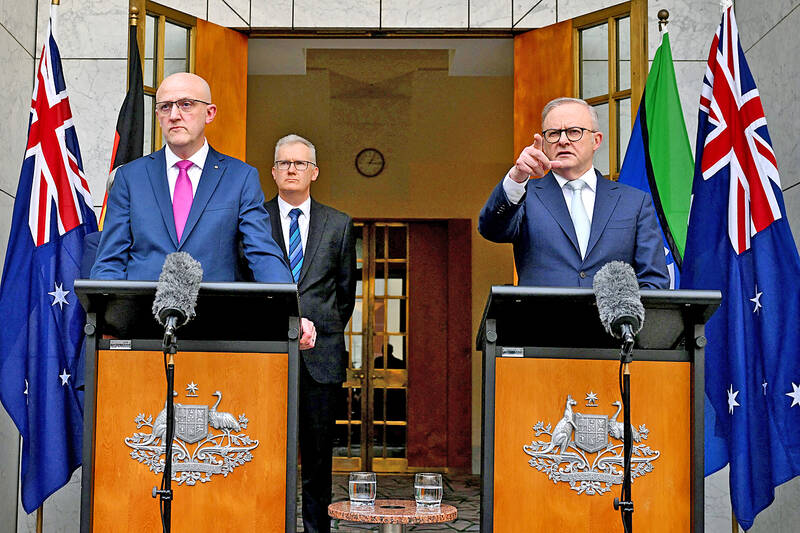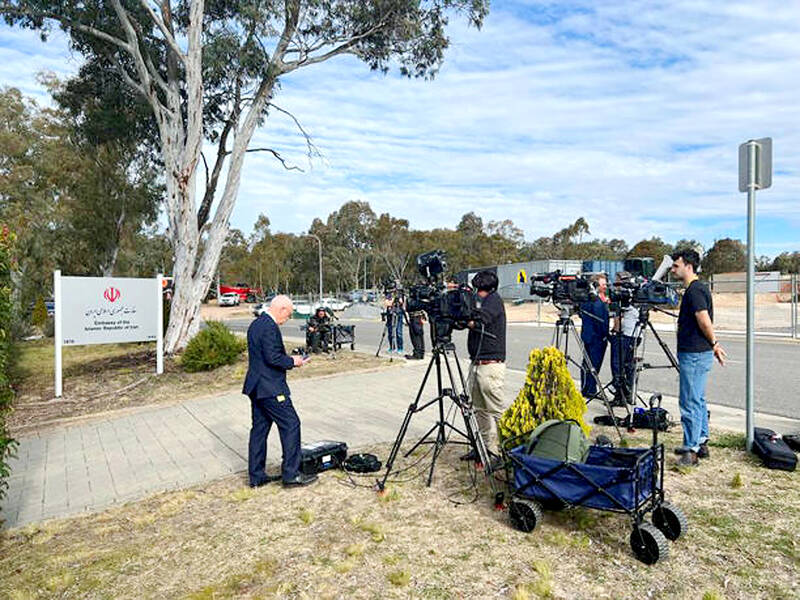Australia yesterday expelled Iran’s ambassador, accusing the country of being behind anti-Semitic arson attacks in Sydney and Melbourne.
It marks the first time Australia has expelled an ambassador since World War II.
Intelligence services reached the “deeply disturbing conclusion” that Iran directed at least two anti-Semitic attacks, Australian Prime Minister Anthony Albanese said.

Photo: EPA
Tehran was behind the torching of a kosher cafe in October last year, he told a news conference.
It also directed a major arson attack on the Adass Israel Synagogue in Melbourne in December last year, he said, citing the intelligence findings.
No injuries were reported in the two attacks.

Photo: Reuters
“These were extraordinary and dangerous acts of aggression orchestrated by a foreign nation on Australian soil,” Albanese said.
“They were attempts to undermine social cohesion and sow discord in our community,” he said.
An Iranian Ministry of Foreign Affairs spokesman denied the accusations and vowed “reciprocal reaction” to any unjustified diplomatic measures by Australia.
Australia declared Iranian Ambassador Ahmad Sadeghi “persona non grata,” and ordered him and three other officials to leave the country within seven days.
Australia also withdrew its own ambassador to Iran and suspended operations at its embassy in Tehran, which opened in 1968.
The Australian diplomats were all “safe in a third country,” Albanese said.
Australia will also legislate to list Iran’s Islamic Revolutionary Guard Corps as a terrorist organization, he said.
Australian Minister for Foreign Affairs Penny Wong (黃英賢) said it was the first time in the post-war period that Canberra had expelled an ambassador.
Canberra will maintain diplomatic lines with Iran to advance the interests of Australians, she said.
Although Australians have been advised not to travel to Iran since 2020, Wong said Canberra’s ability to provide consular assistance was now “extremely limited.”
“I do know that many Australians have family connections in Iran, but I urge any Australian who might be considering traveling to Iran, please do not do so,” she said.
“Our message is, if you are an Australian in Iran, leave now if it is safe to do so,” she said.
A “painstaking” intelligence service investigation had uncovered links between the anti-Semitic attacks and Iran’s Revolutionary Guard, Australian Security Intelligence Organisation Director-General Michael Burgess said.
The probe found that the Guard directed at least two and “likely” more attacks on Jewish interests in Australia, he said.

NATIONAL SECURITY THREAT: An official said that Guan Guan’s comments had gone beyond the threshold of free speech, as she advocated for the destruction of the ROC China-born media influencer Guan Guan’s (關關) residency permit has been revoked for repeatedly posting pro-China content that threatens national security, the National Immigration Agency said yesterday. Guan Guan has said many controversial things in her videos posted to Douyin (抖音), including “the red flag will soon be painted all over Taiwan” and “Taiwan is an inseparable part of China,” while expressing hope for expedited “reunification.” The agency received multiple reports alleging that Guan Guan had advocated for armed reunification last year. After investigating, the agency last month issued a notice requiring her to appear and account for her actions. Guan Guan appeared as required,

A Vietnamese migrant worker yesterday won NT$12 million (US$379,627) on a Lunar New Year scratch card in Kaohsiung as part of Taiwan Lottery Co’s (台灣彩券) “NT$12 Million Grand Fortune” (1200萬大吉利) game. The man was the first top-prize winner of the new game launched on Jan. 6 to mark the Lunar New Year. Three Vietnamese migrant workers visited a Taiwan Lottery shop on Xinyue Street in Kaohsiung’s Gangshan District (崗山), a store representative said. The player bought multiple tickets and, after winning nothing, held the final lottery ticket in one hand and rubbed the store’s statue of the Maitreya Buddha’s belly with the other,

‘NATO-PLUS’: ‘Our strategic partners in the Indo-Pacific are facing increasing aggression by the Chinese Communist Party,’ US Representative Rob Wittman said The US House of Representatives on Monday released its version of the Consolidated Appropriations Act, which includes US$1.15 billion to support security cooperation with Taiwan. The omnibus act, covering US$1.2 trillion of spending, allocates US$1 billion for the Taiwan Security Cooperation Initiative, as well as US$150 million for the replacement of defense articles and reimbursement of defense services provided to Taiwan. The fund allocations were based on the US National Defense Authorization Act for fiscal 2026 that was passed by the US Congress last month and authorized up to US$1 billion to the US Defense Security Cooperation Agency in support of the

CLASSIFIED BRIEFING: The ministry said the special budget focuses on building a comprehensive defense system and strengthening the domestic defense industry The Ministry of National Defense yesterday released information on seven categories of weapons systems to be procured under a stalled NT$1.25 trillion (US$39.57 billion) special defense budget, including precision artillery, long-range missiles, air defense anti-tank missiles and more than 200,000 uncrewed aerial vehicles (UAVs). The Executive Yuan approved a draft version of the budget on Nov. 27 last year and submitted it to the legislature for review. The legislature’s Foreign Affairs and National Defense Committee yesterday invited Minister of National Defense Wellington Koo (顧立雄) to deliver a classified briefing and answer questions at a closed-door session. Koo said he hoped to provide lawmakers